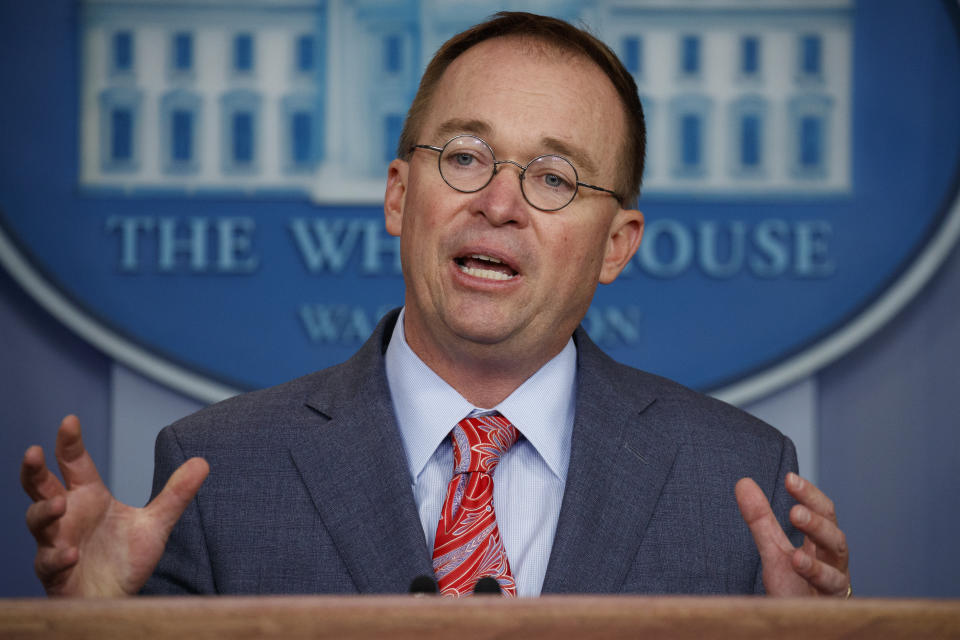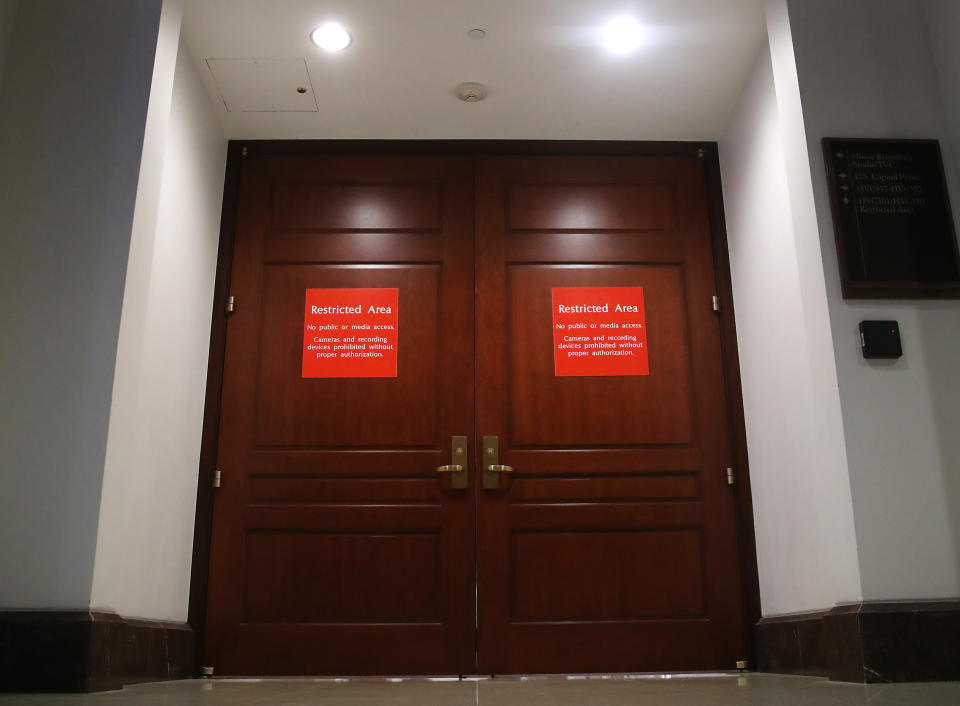White House budget official who could prove key impeachment witness to testify Saturday
WASHINGTON — One of the highest-ranking civil servants at the White House budget office is expected to appear before the congressional impeachment panel on Saturday, providing testimony that could potentially shed light on how Trump administration officials withheld aid from Ukraine in an alleged effort to influence the 2020 U.S. presidential election.
The official, Mark Sandy, was in charge of the Office of Management and Budget, a White House agency that coordinates federal government spending, during the presidential transition. He is currently a deputy associate director there. Sandy would have had a unique vantage point from which to observe any political machinations that went into withholding the Ukraine funds — and then releasing them.
Sandy stood at the intersection of the Congress, the Pentagon and the White House, a crossroads where foreign policy, domestic politics and the complexities of foreign aid collided in the summer of 2019 with unremitting intensity and complexity. Democrats hope his testimony will support allegations about improper political influence by the president.

Sandy did not respond to emailed requests for comment, but his attorney, Barbara Van Gelder, told Yahoo News that “if subpoenaed, he will appear for a deposition this Saturday.”
Such a subpoena has not been served, but Van Gelder said she expected one shortly. The testimony, if it takes place, will be conducted behind closed doors. Van Gelder declined to answer questions relating to the specifics of any testimony Sandy may provide.
If he appears on Capitol Hill on Saturday, Sandy will be the first OMB official to field questions from the impeachment panel, which wants to know how, and why, critical aid to a crucial ally was delayed for several months throughout the spring and summer of 2019, before being abruptly released in mid-September. That release, President Trump has said, came at the behest of Sen. Rob Portman, R-Ohio, who headed OMB in the administration of George W. Bush.
Political appointees at the agency, including acting Director Russell T. Vought and Michael P. Duffey, the associate director for national security programs, have both declined to appear. Mick Mulvaney, the president’s acting chief of staff and formerly the OMB head, has also refused to provide testimony.
Trump’s alleged push to have Ukraine open investigations aimed at a political rival is the basis of the impeachment inquiry, whose public phase opened earlier this week. According to Democrats, Trump had subordinates tell Ukraine’s new president, Volodymyr Zelensky, that he would not get an Oval Office meeting unless he announced an investigation into Hunter Biden, whose father, Joe Biden, is running for president.
An even greater pressure point than prospects of the Oval Office meeting was the $250 million in military aid that Congress had appropriated to Ukraine, which has been fighting Russia-backed separatists in the east since 2014. According to the testimony of multiple witnesses, Trump had diplomats — and one of his personal attorneys, former New York Mayor Rudy Giuliani — make clear to the Ukrainians that if they wanted the military aid, they had to announce the two investigations Trump sought.
In a July 25 phone call with Zelensky, Trump directly asked the Ukrainian president for those investigations. That call became the basis of a whistleblower complaint that sparked the impeachment inquiry.
The president and his allies maintain that he acted within the bounds of his office, however clumsy his request to Zelensky may have been. “House Democrats have discarded the Constitution, tradition and basic fairness merely because they hate Mr. Trump,” wrote the appellate attorneys David Rivkin and Elizabeth Price Foley in a recent Wall Street Journal op-ed that has been widely shared on conservative outlets.
What happened at OMB may be among the most complicated questions in the impeachment inquiry, since much of what the agency does is mired in the little-understood intricacies of how the federal bureaucracy metabolizes money. It could also yield the most definitive answers, because OMB was where the Ukraine funding languished throughout the summer, for reasons that are at the heart of the impeachment inquiry.
That is why Sandy’s testimony could prove so consequential.

Although the funds had already been allotted by Congress, they had to be released by OMB. In May, John C. Rood, defense undersecretary for policy, certified that Ukraine had “taken substantial action” to reduce corruption and were therefore cleared to receive the funds. Pentagon officials expected the $250 million to move quickly, now that concerns about corruption had seemingly been addressed.
But the money would remain held up for months, leading to what one Pentagon official described to Yahoo News as increased anxiety that the funding would expire altogether once the fiscal year ended on Sept. 30. The Defense Department even conducted a legal review of the funding delay, and when it presented its findings to OMB, Pentagon officials learned that the delay had been ordered by the president himself. The Pentagon conceded that Trump had the power to take that step.
It is not yet known what Sandy will say to impeachment investigators — or, for that matter, if he speaks to them at all. But some observers are predicting that should he describe how Vought and Duffey overrode the concerns of career staffers in order to keep the funds on hold, it would bolster the Democrats’ argument that military aid was withheld from Ukraine only because Trump wanted to extract concessions from Zelensky.
“The White House made an end run around Mark, a career OMB official who has served in Democratic and Republican administrations,” Sam Berger of the Center for American Progress, a liberal think tank, told Yahoo News. Berger, who was a senior OMB official in the Obama administration, added that Sandy “would hopefully be able to shed light on two important questions: why the White House suddenly abandoned normal procedure to continue holding up the military aid, and who knew that Trump stopping the funding in this manner was illegal.”
But a senior Trump administration official said such hopes were unfounded and, in his estimation, represented little more than wishful thinking on the part of the president’s detractors. “Democrats are going to be sorely disappointed when their latest false narrative isn’t confirmed,” the administration official said.

The Wall Street Journal reported in October that “career budget staff” in the Trump administration “questioned the legality of delaying the funds.” That article, and another by the Washington Post published the same day, described Duffey as instrumental in enforcing the delay, even after the Pentagon said that corruption concerns had been addressed.
Duffey is the former head of the Republican Party in Wisconsin. He was appointed to Trump’s national security transition team. He later moved to a high-ranking position within the Pentagon, eventually moving to OMB, where he would oversee national security programs.
Duffey would ultimately sign off on the ongoing hold on the $250 million of military aid through an obscure process called apportionment, which allows OMB to ensure that agencies don’t spend all of their allotted funding too quickly. Duffey, however, appeared — according to Democrats — to misuse OMB’s apportionment authority to keep all of the Ukraine funding from flowing for political reasons, instead of simply meting it out gradually, as the law stipulates he is allowed to.
Before Duffey decided to become more involved in the process, Sandy signed national-security-related apportionment notices, since there were routinely held by the highest-ranking career staffer in each OMB section. That process is clearly spelled out in an OMB document that was last updated in June, around the time that the Ukraine funding would have come to OMB’s attention as a matter of presidential significance.
A congressional staffer familiar with the matter confirmed that Sandy was sidelined, though the staffer could not definitively say that this was a result of possible objections to the legality of withholding funding. The staffer says that once the fiscal year ended on Sept. 30, Sandy’s authority over the apportionment process was restored. By that time, the whistleblower complaint had been made public and Democrats were moving toward impeachment.
After this article was published, an OMB official told Yahoo News that the congressional staffer was incorrect, and that Duffey would maintain the oversight role over apportionment that he exercised throughout the spring and summer. "Whoever is saying this is either unfamiliar with OMB or is lying," the OMB staffer told Yahoo News.

The involvement of a political appointee in the disbursement of funds was unusual, the former OMB political appointee Gordon Adams told Roll Call last month. “In five years, I only ever got involved in one apportionment decision that I can remember. In no case did I ever sign an apportionment letter,” Adams said.
The senior Trump administration official who was willing to discuss Sandy’s potential testimony and the apportionment process only on the condition of anonymity described Duffey as intensely interested in the details of his job, and added that Duffey’s involvement in apportionment was well within the portfolio of responsibilities granted to him by Vought.
Vought, for his part, has referred to the impeachment inquiry as a “sham process” on Twitter, echoing the criticisms of many Republicans on Capitol Hill, not to mention the president himself.
By the time August arrived, the end of the fiscal year loomed only weeks away, meaning that the $250 million appropriation to Ukraine would be wiped out and Congress would have to allot the funds all over again. Defense officials were especially concerned about this possibility.
In her testimony to Congress, Laura Cooper, deputy assistant secretary of defense, described how until August, the OMB had in a footnote to its apportionment notices assured the Pentagon that the pause in funding would not prevent the funds from being spent by the Pentagon in a timely manner. Then the footnote disappeared, a tacit recognition that the “timely execution” of the $250 million was becoming close to impossible because the fiscal year was about to end.
Democrats began looking into Vought and Duffey’s role shortly after the whistleblower complaint was made public. On Sept. 27, House Budget Committee Chairman John A. Yarmuth, D-Ky., and House Appropriations Committee Chairwoman Nita M. Lowey, D-N.Y., sent a letter to Vought and Mulvaney in which they expressed “deepening concerns” about “unlawful impoundments” of money that Congress had already appropriated.
The letter deemed Duffey’s role in the apportionment process “unusual and seemingly unprecedented.”
Corrections: This article was corrected to more accurately describe Mark Sandy's role at OMB. An earlier version of this story incorrectly described Duffey's political experience.
_____
Download the Yahoo News app to customize your experience.
Read more from Yahoo News:

 Yahoo Finance
Yahoo Finance 


